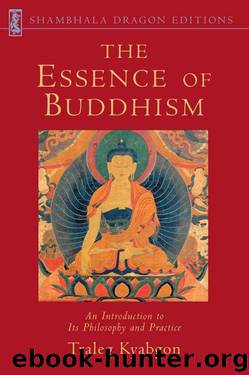The Essence of Buddhism: An Introduction to Its Philosophy and Practice by Traleg Kyabgon

Author:Traleg Kyabgon [Kyabgon, Traleg]
Language: eng
Format: epub
Publisher: Shambhala Publications
Published: 2013-04-23T00:00:00+00:00
Buddha-nature has those four characteristics, but what is the status of Buddha-nature? To put it in philosophical terms, what is the ontological status of Buddha-nature apart from its soteriological orientation and salvific import? In terms of its ontological status, our mind is constantly bogged down by thoughts of whether something exists or does not exist. If something exists it is real; if something does not exist, it is not real. This dualistic way of thinking is so predominant and so much a part of our mental habit that we find it very difficult to escape from. However, when we start to think about the ontological status of Buddha-nature, we do not think about existence and nonexistence. Buddha-nature does not exist in the same way as tables and chairs. Nevertheless, it is also not nonexistent. The ontological status of Buddha-nature—how the Buddha-nature exists—is different from how everything else exists. We cannot say Buddha-nature exists in the way we think of empirical objects in the world existing, or even mental states. When we say everyone is in the possession of Buddha-nature it is not like owning something. It is not like owning a house or a car or a body. We think it should be like this; we have a house, we have furniture—that’s the way it should be, that’s the kind of world we should be living in—but we don’t own Buddha-nature in that way. The closest analogy for Buddha-nature is that of space. Space does not exist as the clouds within space exist; the way it exists is of a different order. We cannot say whether space exists, meaning we cannot say it is like some substantial, inherently existing thing, and we cannot say that it does not exist, that it’s nothing. Space is not nothing because without space—again to a Buddhist way of reasoning—we would not have all the galaxies and planets; even this thought would not be here.
In a fashion, Buddha-nature exists, but to say that it exists is more like a metaphor. You can only really refer to it in an oblique fashion; you cannot pin it down so easily, because Buddha-nature in itself is nothing; it is not a substance. Buddha-nature is not a psychic substance of any kind. It is intrinsically empty, but at the same time, Buddha-nature is the source of enlightenment. Without Buddha-nature, we would not be able to attain enlightenment. If there were only ignorance, conflicting emotions and conceptual proliferation, it would be impossible to find a way out. So in that sense, Buddha-nature exists, but it does not exist as a substantial entity.
According to Mahayana Buddhism, Buddha-nature is not part of causes and conditions, but is self-presenting. We develop a whole new perspective in relation to how we see ourselves when we no longer operate from within the conventional context of ego identity. We have a more expansive view in relation to our abilities and how we are able to see things. We are less opinionated; one is able to embrace things more.
Download
This site does not store any files on its server. We only index and link to content provided by other sites. Please contact the content providers to delete copyright contents if any and email us, we'll remove relevant links or contents immediately.
The Way of Zen by Alan W. Watts(6601)
Ego Is the Enemy by Ryan Holiday(5416)
The Art of Happiness by The Dalai Lama(4125)
The Book of Joy by Dalai Lama(3976)
Why Buddhism is True by Robert Wright(3447)
Spark Joy by Marie Kondo(3299)
Shift into Freedom by Loch Kelly(3194)
Happiness by Matthieu Ricard(3040)
A Monk's Guide to a Clean House and Mind by Shoukei Matsumoto(2912)
The Lost Art of Good Conversation by Sakyong Mipham(2651)
The Meaning of the Library by unknow(2565)
The Unfettered Mind: Writings from a Zen Master to a Master Swordsman by Takuan Soho(2309)
The Third Eye by T. Lobsang Rampa(2260)
Anthology by T J(2210)
Red Shambhala by Andrei Znamenski(2193)
The Diamond Cutter by Geshe Michael Roach(2058)
Thoughts Without A Thinker: Psychotherapy from a Buddhist Perspective by Epstein Mark(2014)
Twilight of Idols and Anti-Christ by Friedrich Nietzsche(1892)
Advice Not Given by Mark Epstein(1878)
